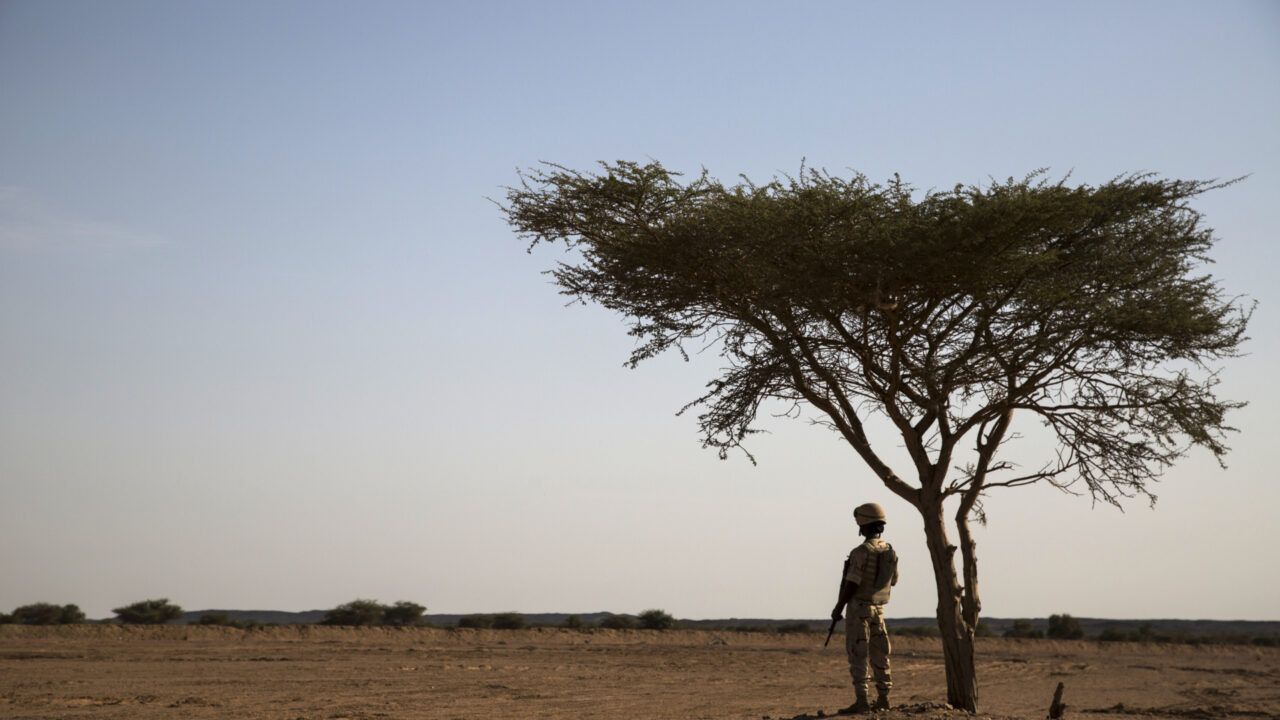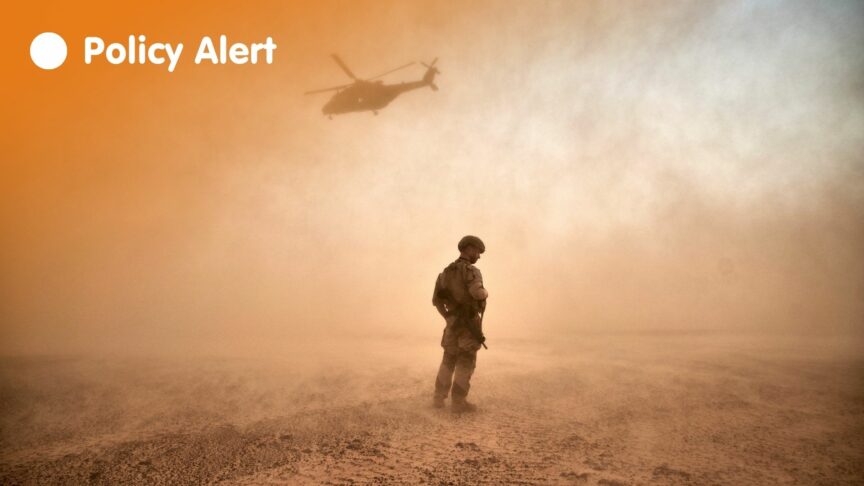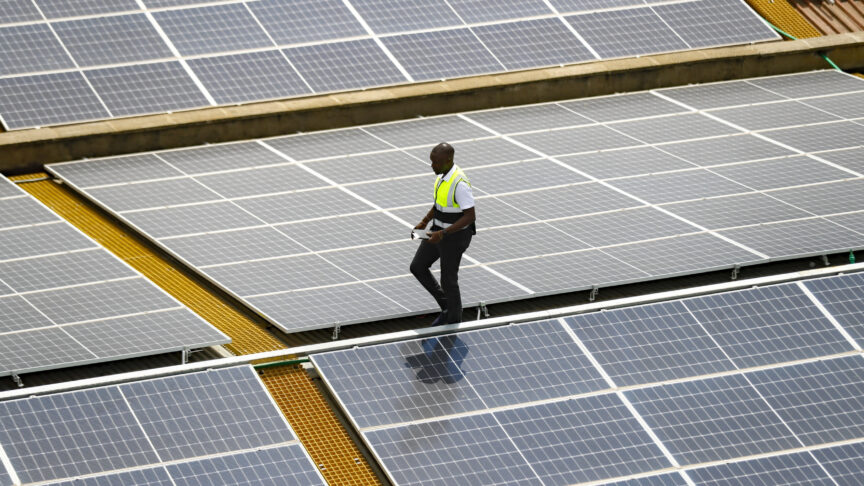Russia’s long shadow in the Sahel
The EU’s values-led foreign policy and its stabilisation objectives in the Sahel are in tension with each other. Russia is now waiting to exploit that tension
The European Union is now proposing up to three new military or training missions in the Sahel and west Africa. These missions are modelled on the approach to stabilisation the EU and its member states developed in Mali – which has had mixed results, at best. A recently leaked EU document explains that the explicit purpose of the missions is to counter the instability spreading from Mali to the Gulf of Guinea. But, implicitly, the missions are also designed to counter Russia’s growing influence in the Sahel.
Russia now provides Sahelian governments with leverage over the EU and its member states. The EU’s new missions will fold without the cooperation of governments such as those in Burkina Faso – which will be able to credibly threaten to turn to Russia in disputes over their democratic standards, a cornerstone of the union’s values-led foreign policy.
The collapse of the EU’s relations with Mali is a case of the past serving as prologue. These relations deteriorated over the coups in 2020 and 2021, paving the way for Russia to offer itself to the Malian government as an alternative.
Moscow supplanted the EU and its member states as Mali’s key security partner, prompting the French government to withdraw its Operation Barkhane from the country. Russian forces’ partnership with Mali’s military created an untenable situation for European cooperation with that military, accelerating the withdrawal of the EU’s and its member states’ missions in the country. The last entity that could function without directly partnering with the Malian and Russian militaries, the UN’s Multidimensional Integrated Stabilisation Mission in Mali (MINUSMA), has had its activities dramatically curtailed by Bamako.
The EU’s Sahel strategy needs to account for Russia but should avoid becoming fixated on expelling it from the Sahel
One lesson from Mali is that the EU will find it difficult to reconcile its values-led foreign policy with its stabilisation objectives in the Sahel – a region where governments are prone to dramatic changes in power (and behaviour). Another is that, if the EU alienates Sahelian governments, Russia will be waiting in the wings.
Russia’s ambitions in Africa extend far beyond the Sahel. The EU increasingly understands that its contest with Russia – sparked by President Vladimir Putin’s war on Ukraine – is spreading to different theatres, including those in Africa. The EU’s Sahel strategy needs to account for Russia but should avoid becoming fixated on expelling it from the Sahel. To make Russian assistance unappealing to Sahelian governments, the EU will need to adopt a flexible approach to its values when they jeopardise relations with a government that is essential to sustaining a military or training mission. When the foreign policy objectives of values and stabilisation come into conflict, stabilisation will need to take priority.
Russia’s niche in the Sahel
Russia does not offer more or better security assistance than the EU. Rather, it gains leverage in the Sahel by giving its partners such assistance without the conditionality that the EU attaches to its own support. This conditionality comes in two forms: pressure on governments to respect democratic norms and prohibitions on the supply of training or arms to certain state forces or non-state actors (due to concerns about how they will be used).
Before Russia increased its interest in the Sahel in recent years, the EU could reshape the political compact within Sahelian countries in a relatively benign geopolitical environment. For example, a permanent end to jihadism in Mali’s rural areas would require the central government to make difficult reforms and adopt a more inclusive governance model. When the EU was the biggest game in town, it had greater leverage over Mali’s government – which drew enormous benefits from EU member states’ rush to engage with the region (out of concern about terrorism, migration, European solidarity, or conflict driven by climate change).
But European stabilisation missions in Mali now depend on the goodwill of the military junta that runs the country. The junta’s seizure of power in a coup in May 2021 created tension between the EU’s values and its stabilisation goals. European states, led by France, increased pressure on the government for a transition back to democracy. This created an opening for Russia, which offered the junta support without the onerous conditions set by its European rivals. Moscow had no complaints about civilian abuses marring the Malian armed forces’ counter-insurgency operations in central Mali.
Warning signs in Niger and Burkina Faso
There are already signs that the EU could face a similar dilemma in Niger, which is becoming the central node in the new European security architecture in the Sahel. Some members of Niger’s political class and its wider population have protested against the government’s decision to allow European forces on its soil. To legitimise the increased European presence in the country, Niger’s National Assembly voted in April to approve the arrival of foreign troops. Nigérien President Mohamed Bazoum has suggested that he will impose conditions on some European initiatives in the country, such as by blocking the new EU Training Mission (EUTM) in Niger but encouraging bilateral training missions similar to Operation Gazelle, based in Tillia. This approach may be motivated by the government’s desire for missions suited to its needs. But it could also signal the government’s intent to increase Niger’s leverage by preventing the EU and its member states from adopting a collective bargaining position by combining their missions.
The government in Burkina Faso, another likely host of an EU military mission, also came to power in a coup and has aggressively resisted pressure for early elections, insisting on a suspiciously lengthy political transition. French forces have worked to improve their relationship with Burkina Faso’s new leaders and conducted some military operations in support of the government and its beleaguered military. But the situation remains tense: some regional officials suggest privately that the transitional government remains open to Russian security assistance. There have been few governance reforms under Burkina Faso’s new leaders (although they have given themselves and senior officials a pay rise). And the security situation remains dire, with large portions of the country beyond state control; near-daily attacks on civilians, security forces, and government-aligned militias; and an increase in refugees and internally displaced persons.
Europe’s interests in the Sahel
European leaders have difficult choices to make in the Sahel. If the EU and its member states want to remain engaged with the region, they will need to explain their interests in doing so.
For instance, the EU has stated that it has an interest in protecting civilians in rural areas of the Sahel threatened by jihadist-driven violence. But its capacity to achieve this will evaporate once European stabilisation and military missions withdraw from the countries in question. And European leaders’ statements of support for MINUSMA as a form of multilateralism can ring hollow, given that there are many other ways to strengthen multilateralism without that particular UN mission. Equally, while declarations of unconditional support for countries in the Sahel may have a sentimental appeal, they can prompt governments in the region to take European assistance for granted.
European policymakers privately admit that Europe faces migration and terrorism threats emanating from the Sahel. But one can challenge their assumptions on this, too: deteriorating security in the Sahel does not inevitably increase migration to Europe; nor do jihadist advances directly heighten the threat of terrorist attacks in Europe.
Nearly all the foreign policy interests the EU publicly refers to are values-based. This means that the union will need to compromise with Sahelian governments on one values-based aspect of its foreign policy – supporting democracy – to sustain a different one: stabilisation missions that may protect civilians, demonstrate Europe’s merit as a stalwart ally to the Sahelian people (not only their governments), and support multilateralism (by finding a modus vivendi with Mali’s junta government as regards MINUSMA).
Following Chancellor Olaf Scholz’s recent visit to Niger – in which he promised to extend the German military mission there – Berlin has established co-ownership with Brussels of European engagement with the Sahel. As the new Sahel missions take shape, Berlin and Brussels need to define European interests in the Sahel in a way that justifies the trade-offs between values and stabilisation required to protect those interests. They should explain how an emphasis on democracy – particularly via elections – and security assistance both serve the needs and demands of civilians in the Sahel.
The European Council on Foreign Relations does not take collective positions. ECFR publications only represent the views of their individual authors.



